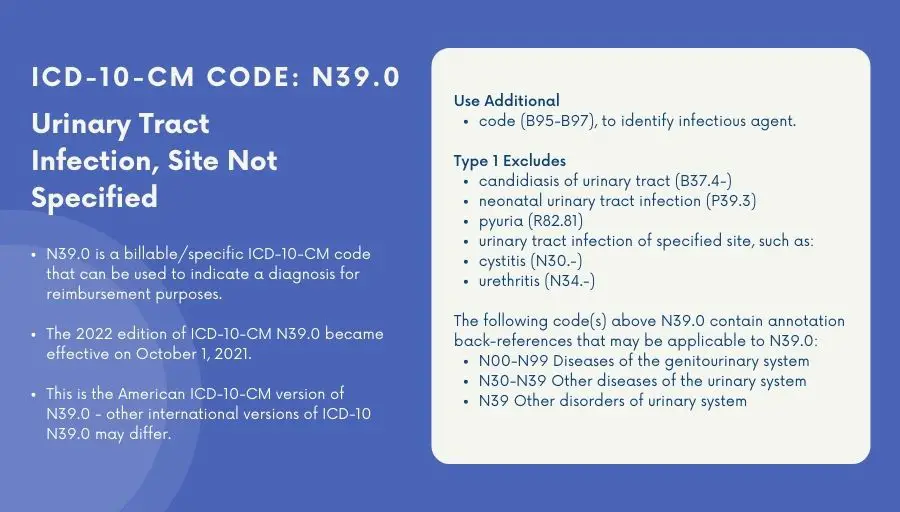(2023) How To Code UTI ICD 10 (Urinary Tract Infection) – List With Codes & Guidelines
A urinary tract infection (UTI ICD 10) is caused by microbes when a bacteria gets into the urine and affects the urinary tract.
This article will outline the causes, symptoms, diagnosis, treatment and ICD 10 codes for urinary tract infection (UTI ICD 10).
What Is Urinary Tract Infection ICD 10?
The urinary tract is the small tubes that carry urine out of the kidneys to the bladder and out of the body. The urethra is the narrow passage through which urine passes and normally they are relatively free from germs.
When an infection develops, an infection in the urinary tract, there is a slight chance of it passing into the ureters or the kidneys. This is what we call bladder infection, kidney infection or both.
The main sources of urethral infection are bacteria, fungi, viruses and parasites. There are also some other infections in the urinary tract, which are asymptomatic.
What Are The Causes Of Urinary Tract Infection ICD 10?
Urine infections can be caused by bacterial or viral infection of the urinary tract. The Urine Reflux Disease (URD) can be the cause of bacterial infections. When the bacteria gets into the urine, it can be very harmful and cause urinary tract infection. It can even cause damage to the kidneys.
When the bacteria or viruses do not get treated, it can cause pus to form on the lining of the bladder and urethra. The bacteria can then migrate into the urethra and cause infection. Signs of Urinary Tract Infection (UTI ICD 10) are a feeling of painful urination and blood in urine.
Urinary tract infections are most commonly found in females but can be caused in males. Urinary tract infections can also be caused due to chronic infections in males.
What Are The Symptoms Of Urinary Tract Infection?
The first symptom is a feeling that you have to pee, particularly when you are not urinating.
The next sign is pain in the lower abdomen, groin, lower back and genitals. Next, you may have trouble keeping the urine in the bladder, especially if you have a prolonged bladder syndrome, so the urine may spill out of the bladder, running down the legs.
In some cases, the blood in the urine may become thick or opaque, which causes dark red streaks when you are sick. Symptoms can get worse without needing to urinate. The urine may become cloudy and watery without needing to urinate.
How Is UTI ICD 10 Diagnosed?
There are two types of UCTs that lead to UTIs – urine infections and urethritis (the other kind of UTI). Urinary tract infections (UTIs) happen when the bacteria in the urinary tract get into the urine or small amounts of urine.
If a doctor suspects that the UTI is caused by bacteria, they may use a simple urine test (urine culture) to diagnose the infection. A negative result is sufficient to diagnose a UTI, which is quite easy to diagnose.
If a person has a culture test, the lab technicians will take the urine and culture it to see if there are bacteria in the urine. If the test is positive, it means that the bacteria got into the urine. The test takes at least 2 days, but usually takes 8 days to be fully positive.
Treatment For UTI ICD 10
It is highly important to understand the symptoms and causes of a urinary tract infection in order to treat the infection effectively and minimize the risk of getting infected.
The patient needs to stay hydrated, urinate when the need arises, wipe from front to back after using the toilet a good sexual hygiene is needed. Doctors usually treat Urinary Tract Infection with antibiotics.
List Of ICD 10 Codes For Urinary Tract Infection (UTI ICD 10)
The ICD 10 codes for Urinary Tract Infection (UTI) can be found in chapter 14 of the ICD 10 manual.

ICD 10 Code N30.00: Acute cystitis without hematuria.
ICD 10 Code N30.01: Acute cystitis with hematuria.
ICD 10 Code N30.10: Interstitial cystitis (chronic) without hematuria.
ICD 10 Code N30.11: Interstitial cystitis (chronic)with hematuria.
ICD 10 Code N30.20: Other chronic cystitis without hematuria.
ICD 10 Code N30.21: Other chronic cystitis with hematuria.
ICD 10 Code N30.30: Trigonitis without hematuria.
ICD 10 Code N30.31: Trigonitis with hematuria.
ICD 10 Code N30.40: Irradiation cystitis without hematuria.
ICD 10 Code N30.41: Irradiation cystitis with hematuria.
ICD 10 Code N30.80: Other cystitis without hematuria.
ICD 10 Code N30.81: Other cystitis with hematuria.
ICD 10 Code N30.90: Cystitis, unspecified without hematuria.
ICD 10 Code N30.91: Cystitis, unspecified with hematuria.
ICD 10 Code N34.0: Urethral abscess.
ICD 10 Code N34.1: Nonspecific urethritis.
ICD 10 Code N34.2: Other urethritis.
ICD 10 Code N34.3: Urethral syndrome, unspecified.
ICD 10 Code N39.0: Urinary tract infection, site not specified.
ICD 10 Code N39.9: Disorder of urinary system, unspecific.
Reimbursement Urinary Tract Infection ICD 10 (UTI ICD 10)
N39.0 is a billable/specific ICD 10 CM and can be used for reimbursement.


